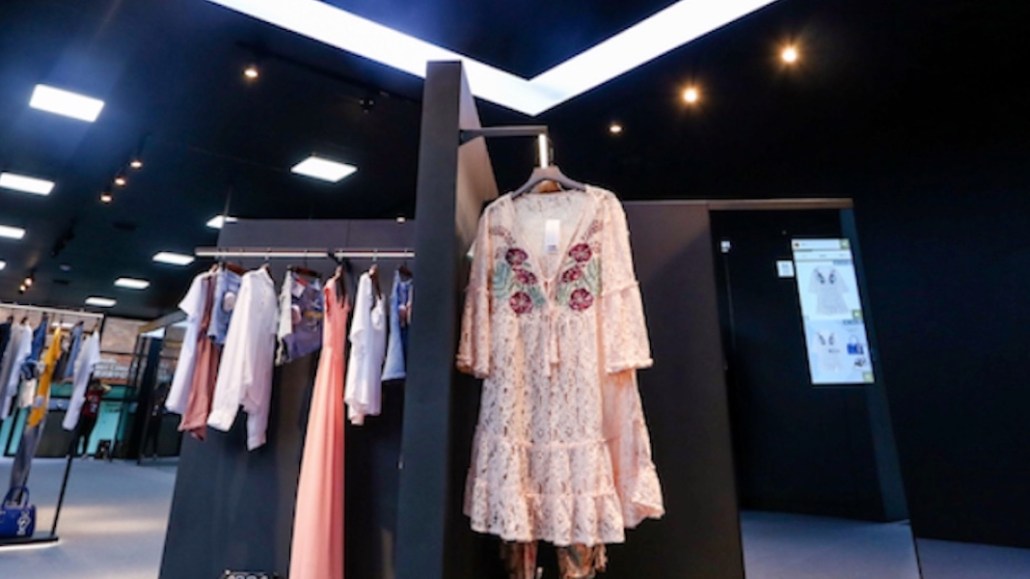
Alibaba’s first smart store is open, and Guess is acting as its retail guinea pig.
The new Guess store in Hong Kong is outfitted with Alibaba’s FashionAI technology, which combines in-store shopping with inventory and personalized data sourced from Alibaba’s Taobao and Tmall e-commerce marketplaces. Every customer who walks into the store checks in with their Taobao mobile IDs, used to track items that are tried on, saved for later, or purchased, and personalize product recommendations online based on that behavior. Each item in the store is equipped with RFID tags so that smart mirrors and smart fitting rooms can identify and respond to individual customer interactions with any piece of clothing. Taobao mobile virtual kiosks display items in sizes and colors that aren’t available in stores. Check-out is done by scanning the mobile app.
The store is part of Alibaba’s ongoing “New Retail” initiative, which aims to restructure traditional retail by digitizing the in-store experience with endless aisles, mobile check-in, smart mirrors, customization kiosks and stores that double as distribution centers. So far, the company has invested nearly $8 billion in the project.
For Guess, Inc., the FashionAI store is part of the company’s ongoing partnership with Alibaba to expand the brand’s presence in Asia. The region is the company’s fastest-growing market: For the first quarter of its financial 2019, revenue in Asia increased by 32 percent, while e-commerce sales increased by 22 percent. While Guess doesn’t break out revenue by region, overall, revenue for the quarter increased 15 percent to $521 million. The brand continues to keep building on that opportunity by tightening ties to Alibaba, and participating in new technology initiatives thrown its way. This has led to more investment in physical stores: Guess has opened eight directly operated stores in the region in the last quarter alone, which will accommodate the new FashionAI technology. According to José Blanco, the CEO of the Greater China market at Guess, the first store came together in only five months.
“This is a unique opportunity for us to collaborate with Alibaba in this experiment in experiential physical retail that we believe will provide us consumer insight that will enhance our e-commerce business, both with them on Tmall and in our physical stores,” said Victor Herrero, Guess’s CEO, on an earnings call with investors in June. “We are trying to apply a lot of new technology into the retail shop and I think the partnership with [Alibaba] is strong. China has a lot of potential for us in the future and I think we should continue trying to benefit from that.”
Alibaba and peers like JD.com are reaping the benefits of an all-eyes-on-China era of luxury fashion, where the local industry is outpacing the global market, and expected to reach $587 billion by 2020, up from $493 billion in 2016. By offering marketing consultations, distribution logistics services, and a separate “Luxury Pavilion” shopping destination geared toward high-spending customers, Alibaba is taking the anti-Amazon approach of positioning itself as a brand ally, acting as a gateway to the Chinese market.
Like Amazon, Alibaba’s interest in fashion has been steadfast. FashionAI has been in development over the past seven years, according to Alibaba group vp Zhang Zhuoran, and extends beyond the Guess partnership. The system’s algorithms have processed millions of clothing items and accessories in that time across fashion brands selling on Taobao and Tmall, building up the ability to recognize clothing and accessory features (like cut, color, size and fit) and track and predict trend lifecycles. The goal is to move beyond single-product, “if you like this, try this” recommendations to more complex build-an-outfit recommendations, which can appear both online and in FashionAI stores. According to Alibaba, more than 500,000 outfits have been put together by the algorithm, using machine learning and computer vision.
The algorithms aren’t brand-specific: For instance, if someone shopping at the Guess store saves an item they tried on, but doesn’t try on any of the Guess products available in store that are recommended in the smart fitting room, their Taobao mobile app will build outfit recommendations sourced from thousands of other Taobao and Tmall brands. While Alibaba is fostering strong individual brand partnerships, the technology it’s building is still focused on amassing data to personalize its sprawling marketplace for customers.
“This is a major step. This is would be the equivalent of consumers having their own personal stylists,” said Zhuoran in a statement.
More in Marketing

WTF are tokens?
When someone sends a prompt or receives a response, the system breaks language into small segments. These fragments are tokens.

AI is changing how retailers select tech partners
The quick rise of artificial intelligence-powered tools has reshaped retailers’ process of selecting technology partners for anything from marketing to supply chain to merchandising.

YouTube’s upmarket TV push still runs on mid-funnel DNA
YouTube is balancing wanting to be premium TV, the short-form powerhouse and a creator economy engine all at once.









